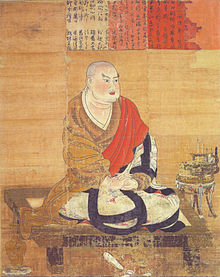 | |
| Personal life | |
| Born | Yuchi (surname) Hongdao (style) 632 |
| Died | 682 (aged 50) |
| Parents |
|
| Religious life | |
| Religion | Buddhism |
| School | East Asian Yogācāra |
| Senior posting | |
| Teacher | Xuanzang |
Kuījī (traditional Chinese: 窺基; simplified Chinese: 窥基; Japanese: Kiki; Korean: Kyugi; 632–682), also known as Ji (Chinese: 基),[2] an exponent of Yogācāra, was a Chinese monk and a prominent disciple of Xuanzang.[3] His posthumous name was Cí'ēn dàshī (慈恩大師; 'Master Ci'en'), The Great Teacher of Cien Monastery, after the Daci'en Temple or Great Monastery of Compassionate Grace, which was located in Chang'an, the main capital of the Tang Dynasty. The Giant Wild Goose Pagoda was built in Daci'en Temple in 652. According to biographies, he was sent to the imperial translation bureau headed by Xuanzang, from whom he later would learn Sanskrit, Abhidharma, and Yogācāra.[4]
Kuiji collaborated closely with Xuanzang on the Cheng weishi lun, a redacted translation of commentaries on Vasubandhu's Triṃśikā-vijñaptimātratā.[4] Kuiji's commentaries on the former text, the Cheng weishi lun shuji, along with his original treatise on Yogācāra, the Dasheng Fayuan yilin chang (大乘法苑義林章; "Essays on the Forest of Meanings in the Mahāyāna Dharma Garden") became foundations of the Faxiang School, the dominant school of Yogācāra thought in East Asia.[3] He is accordingly considered the founder of this school which differed notably from Paramārtha's earlier Chinese Yogācāra system. Kuiji is also known for his commentaries on Dharmapāla's Yogācāra philosophy.[4]
- ^ De Visser, Marinus Willem (1935). Ancient Buddhism in Japan. E. J. Brill. p. 442.
- ^ "中国历史上排名第二的高僧究竟叫什么名字?" (in Chinese). The Paper. 20 December 2015. Retrieved 20 December 2015.
- ^ a b Lusthaus, Dan (undated). Quick Overview of the Faxiang School (法相宗). Source: [1] (accessed: December 12, 2007)
- ^ a b c Cite error: The named reference
dicwas invoked but never defined (see the help page).
